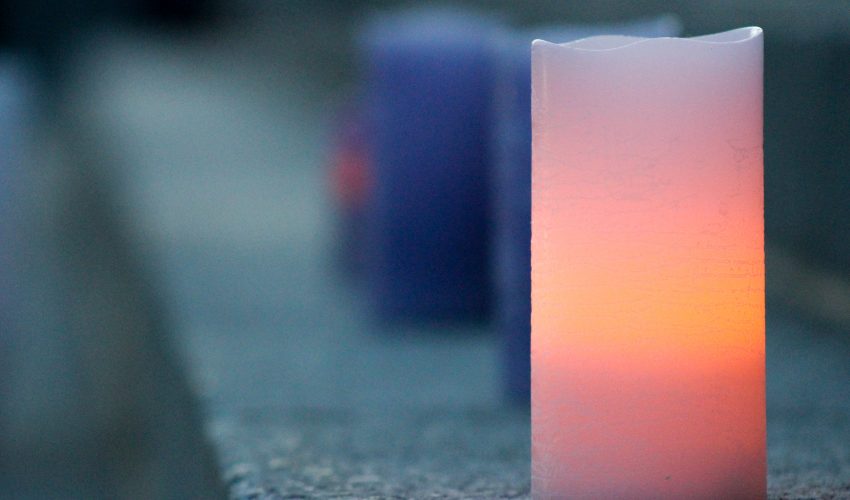On Sunday night, people from all walks of life gathered together on the front steps of the Utah State Capitol for a candlelight vigil to support those who have experienced the tragedy of a violent crime, as well as to honor the victims who lost their lives.
A Victim Centered Approach
Utah Attorney General Sean D. Reyes attended the event, sharing the importance of having a victim-centered and trauma-informed approach in the criminal justice system and the continuous efforts of the Attorney General’s Office to incorporate it into their work.
“A victim’s experience with the criminal justice system can mean the difference between supportive and healing experience versus one that exacerbates their initial pain and trauma. Criminal acts can often strip victims of a sense of control, not to mention a sense of safety, security, self-confidence, and self-worth. Making sure victims are advised of their statutory rights, informed of the status of their case, and reassuring them along the way that they have done nothing wrong, that they are not at fault, these things can empower them to begin taking back their own lives,” said Attorney General Reyes.
The Attorney General’s Office has a unique opportunity to work with victims throughout almost every stage in the criminal justice system, from investigation to prosecution. Taking a victim-centered approach helps to minimize re-traumatization and provides victims with a compassionate and nurturing space in which to navigate the criminal justice system.
Listen to Attorney General Reyes’ speech below.
Stories from Survivors
During the candlelight vigil, survivors shared their experiences with abuse, trauma, and how they overcame their past.
Coming up on its 20th anniversary, four survivors of the Columbine High School shooting and bombing shared their experiences that fateful day on April 20,1999. Sarah Bush, Will Beck, Laura Hall, and Tami Diaz, who were all students at the time of the tragic incident, have together formed Rebels for Change, an organization that works to make schools safer for children. They each shared their separate stories and spoke about what it means to be a victim and the hope and healing that victims can look towards.
Listen to their stories below.
Jenny Andrus, a professor at the University of Utah who currently teaches writing and rhetoric, as well as studying and reaching domestic violence, is a survivor of domestic violence herself. She shared her story of emotional and physical abuse. She spoke on how emotional abuse is often overlooked but can have the same horrible consequences as any other type of abuse. She spoke on the importance of the victims advocate program utilized by law enforcement.
Listen to her story below. Be advised of potential trigger warnings.
Sidney Andrews, a current Salt Lake Community College student studying Criminal Justice, shared her story on surviving sexual and emotional abuse by her step-father for 13 years. Andrews emphasized the importance of the victim advocate programs, and how her advocate was with her every step of the way through the court case and through her own healing. She spoke on the need for victims to have a voice, and how that voice was able to be heard through her family and advocate.
Listen to her story below.
Brielle Decker is a former member of the Fundamentalist Church of Jesus Christ of Latter-Day Saints (FLDS) and was the 56th wife of Warren Jeffs, a former president of the FLDS Church. Decker spoke about her sexual abuse and about the importance of understanding trauma as a way to protect your families and become compassionate towards others. Decker has since created the Dream Center, a transition point and a place of healing for those who have left the FLDS Church. The Dream Center aids hundreds of people each year.
Listen to her story below.
Current Legislation to Aid Victims
Lastly, Representative Angela Romero spoke about the current legislative progress made for victims and about what you can do to help advocate for victims.
Listen to her speech below.
HCR 6 Concurrent Resolution Designating May 5 as Missing and Murdered Indigenous Women, Girls, and LGBT+ Awareness Day highlights data related to missing and murdered indigenous women, girls, and LGBT+ and calls on the people of Utah and interested groups to commemorate the lives of those lost on May 5.
HB 234 Marriage Amendments increased the minimum age of marriage to 18. In certain circumstances, court authorization and consent by a parent or guardian may permit a lower age, but in all other circumstances, a person must be 18 years of age to legally marry.
SB 103 Victim Targeting Penalty Enhancements, otherwise known as the hate crimes bill, provides an enhanced penalty for a criminal offense committed against a victim based on age, ancestry, disability, ethnicity, familial status, gender identity, homelessness, marital status, matriculation, national origin, political expression, race, religion, sex, sexual orientation, service in the U.S. Armed Forces, and status as an emergency responder.
The candlelight vigil was held as a part of the National Crime Victim’s Rights Week. For additional events and opportunities, check out https://attorneygeneral.utah.gov/national-crime-victims-week/.
To listen to the full candlelight vigil:
Check out the media coverage below:
KUTV: National Crime Victim’s Rights Weeks Honors Victims with a Candlelight Vigil

